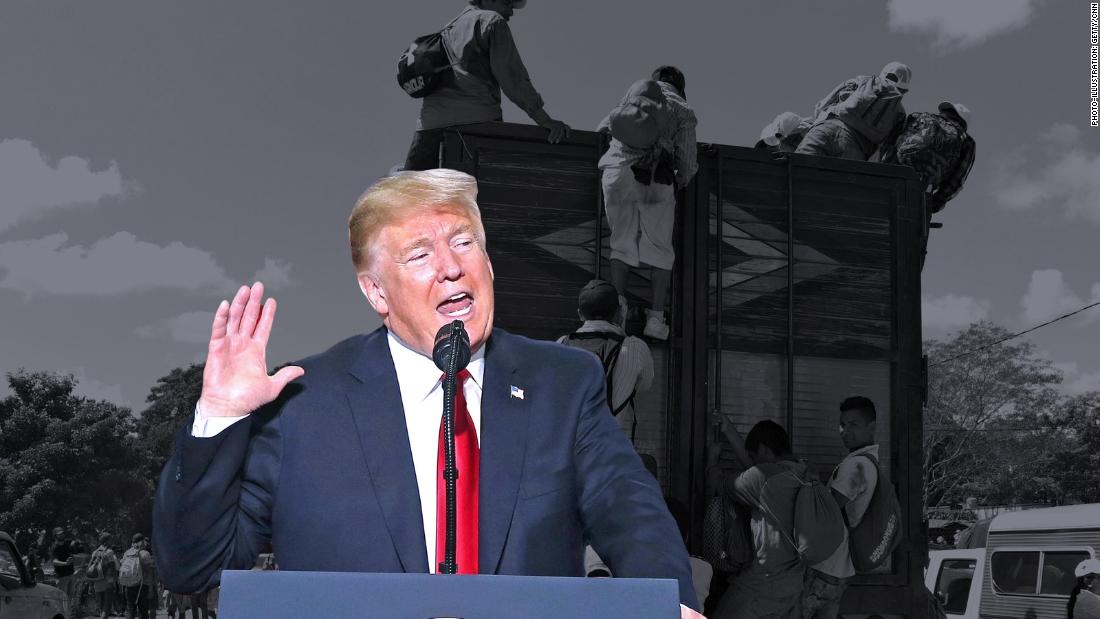[ad_1]
With just two weeks to go before the midterm election, the President is doing what he does best, seizing national attention with a flood of outrageous and improbable lies that drown out rivals, leverage his brawling personality and rip at fault lines of race, identity and patriotism.
Above all, Trump is hardening his line on immigration, the explosive issue that is usually a winner for him, in a strategy designed to drive his loyalists to the polls to defy ominous midterm omens that haunt every first-term president.
But Trump’s gamble may not be universally successful. His clamorous approach could backfire in the more moderate suburban districts where the battle for the House will be decided and he ran behind Hillary Clinton in 2016.
And his strategy — which is essentially a case of a President grabbing some of the most emotive, divisive political issues and demagoguing them in a fear-based campaign for his own benefit — is likely to leave the nation more polarized and unable to reach solutions to its most pressing problems.
The President’s midterm onslaught is playing out in rallies across the nation that mostly target conservative regions where he is most popular.
His latest stop was Texas, where he appeared alongside former GOP presidential primary rival Sen. Ted Cruz on Monday night.
“The Democrats have launched an assault on the sovereignty of our country, the security of our nation and the safety of every American,” Trump said, blaming Democrats for “the crisis on our border.”
Vehemence of rhetoric
Trump is certainly not the first politician to distort the profiles and positions of his opponents or to suggest that their positions are un-American.
But the volume and vehemence of Trump’s rhetoric, and his willingness to fling explosive claims even though they are demonstrably untrue is unlike any campaign in decades.
The television footage of people marching across Mexico plays directly into Trump’s rhetorical law-and-order construct of a nation under siege from outside criminal elements — no matter what the reality on the ground may be. Trump’s claims are also relayed by conservative media.
“A Democratic victory in November would be a bright flashing invitation to every trafficker, smuggler, drug dealer and illegal alien on the planet. Come on in, folks,” Trump said in Arizona.
“A Republican victory would send the message that America will enforce our borders and defend our citizens. It’s important.”
Trump’s tough approach has highlighted one of his most useful political assets that also makes him the most dangerous threat to the conventions of the political system in decades — his lack of shame and willingness to make brazen arguments based on lies, which most presidents would avoid.
His energy and willingness to campaign like he is on the ballot may also be a factor.
“We’ve added a lot of spice to it, when I say we, maybe it’s I, and others perhaps. They see that I am coming here,” Trump said, in an interview with ABC 13 News in Houston.
How do Democrats respond?
Trump’s spiced up rhetoric has left Democrats facing questions about how to respond since they have no one on the national political stage with the star power of the President. Former Vice President Joe Biden on Monday accused Trump of scaremongering over the border and a caravan that is still 1,000 miles away.
“He’s making it sound like they’re breaking through the border. This is hysteria on his part,” Biden, a potential 2020 Democratic candidate, told CNN while campaigning in Florida.
On Saturday, the top two Democrats in Congress, Chuck Schumer and Nancy Pelosi, argued that Trump’s harsh turn was a sign of weakness rather than strength.
“The president is desperate to change the subject from health care to immigration because he knows that health care is the number one issue Americans care about,” they said in a joint statement.
In some ways, Trump does not have many options but to go on such a rampage. He’s built his presidency on keeping his base angry — and in the process has alienated many more moderate voters. So only a presidential-election-level turnout from his base in a midterm election is likely to stave off big Democratic gains at a time when the opposition party is also enthusiastic.
And he knows that immigration — from the moment he stepped on the escalator in Trump Tower in 2015 to be a candidate — is the issue that has helped him at the ballot box more than any other, despite political missteps like the separation of undocumented immigrant families and their children earlier this year.
“I think Donald Trump is President because of the immigration issue,” Scott Jennings, a former campaign aide to Bush, told CNN on Monday.
“He wants to paint a line between a party that wants border security and a party that doesn’t.”
But former Clinton campaign manager Robby Mook argued that the fragmented nature of the Senate and House races meant that Trump’s immigration rhetoric represented a high-risk strategy.
“I don’t think it is going to save them in these suburban areas that are so important for the House map or the gubernatorial map,” Mook told CNN’s Erica Hill.
[ad_2]
Source link

